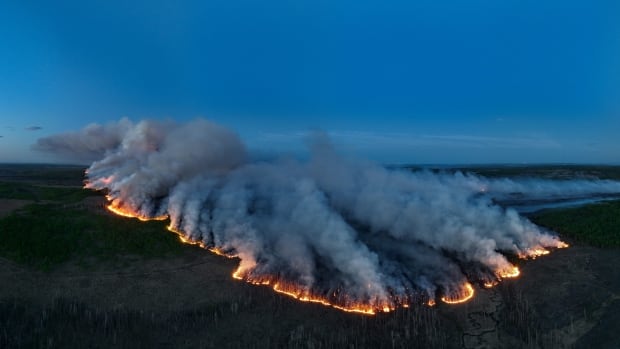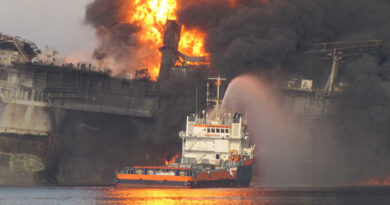B.C. wildfires fuel online conspiracy theories, says researcher

As wildfires burn in parts of British Columbia, rumours and conspiracy theories about them are spreading online, according to a researcher.
Darryn Wellstead, who researches social media and misinformation and teaches sociology at Northern Lights College in Fort St. John, B.C., says social media covers a multitude of theories, including how climate change is a hoax used to destroy the oil and gas industry and how the government uses wildfires as a scare tactic to force people into 15-minute cities.
“Most of the theories were that the fires were politically motivated and not just a consequence of accidents or bad decision making,” said Wellstead.
“[The conspiracy theories] are symptomatic of something bigger that’s happening.”
Wellstead says political polarization has led to an increase in conspiracy theories globally, including in B.C. during wildfire season.
“People are more likely to turn to conspiracy theories when they feel fear and anxiety,” Wellstead said.
“[They] can sometimes give us a way to explain what may otherwise feel unexplainable … [and] give us a sense of control where we feel out of control.”
Daybreak North9:39Stopping wildfires and misinformation
What is it about forest fires that sparks conspiracies?
‘Alienated and disenfranchised’
When wildfires were raging near the city of Fort St. John, approximately 600 kilometres northwest of Edmonton and 1,200 kilometres north of Vancouver, Wellstead turned to a variety of social media pages and groups to see what was being discussed.
“There were rumours that the fires were started by Antifa. People were suggesting fires were being set by anti-oil activists,” she said.
Wellstead says she’s seen an increase in people engaging in and believing misinformation, noting nearly 25 to 30 per cent of people believe in at least one conspiracy theory.
“In Fort St. John and other areas in northeastern B.C. … people are feeling somewhat alienated and disenfranchised by our current government,” she said, adding the fight against climate change may be perceived as a threat to residents working in the oil and gas industry.
Another reason for online theories, Wellstead notes, is the stress and uncertainty that comes with emergency situations.
In the case of wildfire evacuation alerts and orders, she says theories are fuelled by echo chambers where worries are amplified and opposing ideas are often shut out.
“In our situation we had a little bit of an information vacuum, where people were concerned really on an hourly basis what was happening with the fire, [especially] when your home or your family might be at risk,” she said.
“[When] that information is not provided, people will go ahead and fill in those gaps.”
She suggests the B.C. Wildfire Service (BCWS) provide more frequent information and address conspiracies during emergencies.
New ways to inform
Forrest Tower, a B.C. Wildfire Service information officer, is no stranger to conspiracy theories.
In 2021, Tower was the subject of a theory that alleged he was a government-hired actor and not a real person, given how well his name suits his job.
“[It was] going around that a fire information officer with my name couldn’t possibly be real,” he said, adding while it was funny at first, theories can affect emergency operations.
“It can impact the operations we’re doing and, even broader, the public trust in authority and government.”
Tower says BCWS works in partnership with First Nations, local authorities and municipal governments to be the sole source of wildfire information.
But he says information can get lost among other narratives being shared on social media, forcing BCWS to find new ways of addressing concerns and theories.
“We’re doing a lot more in terms of video production … We’re trying to modernize or change our tactics in terms of how information is shared directly to the public,” he said, adding the visual information and explanations have so far been effective in combating counter-narratives.
Tower encourages anyone with questions about wildfires or something they’ve read online to reach out to BCWS and speak to an information officer.
Wellstead suggests social media users subscribe to a variety of information sources and take the time to be exposed to differing points of views.
“By exposing ourselves to different sources, we’re less likely to be insulated ideologically,” she said.


